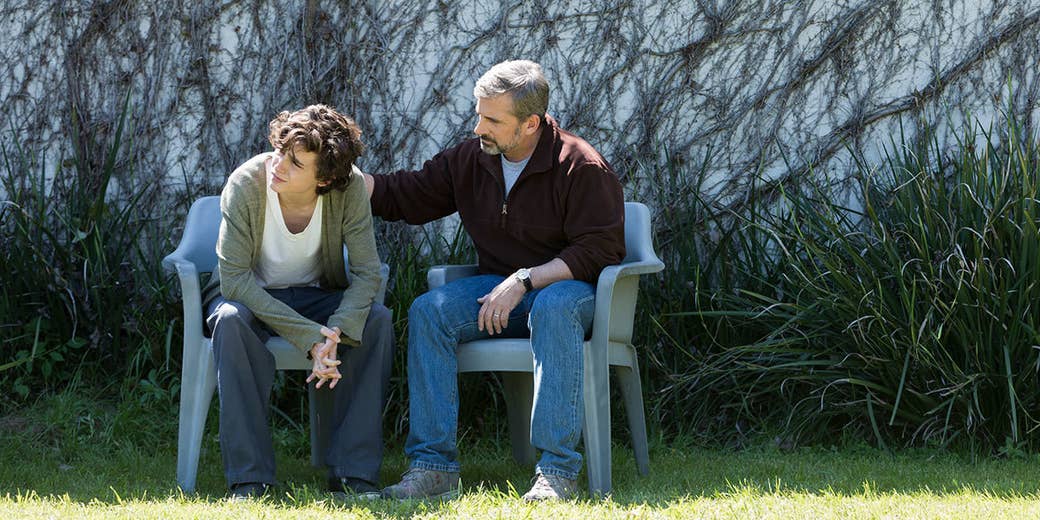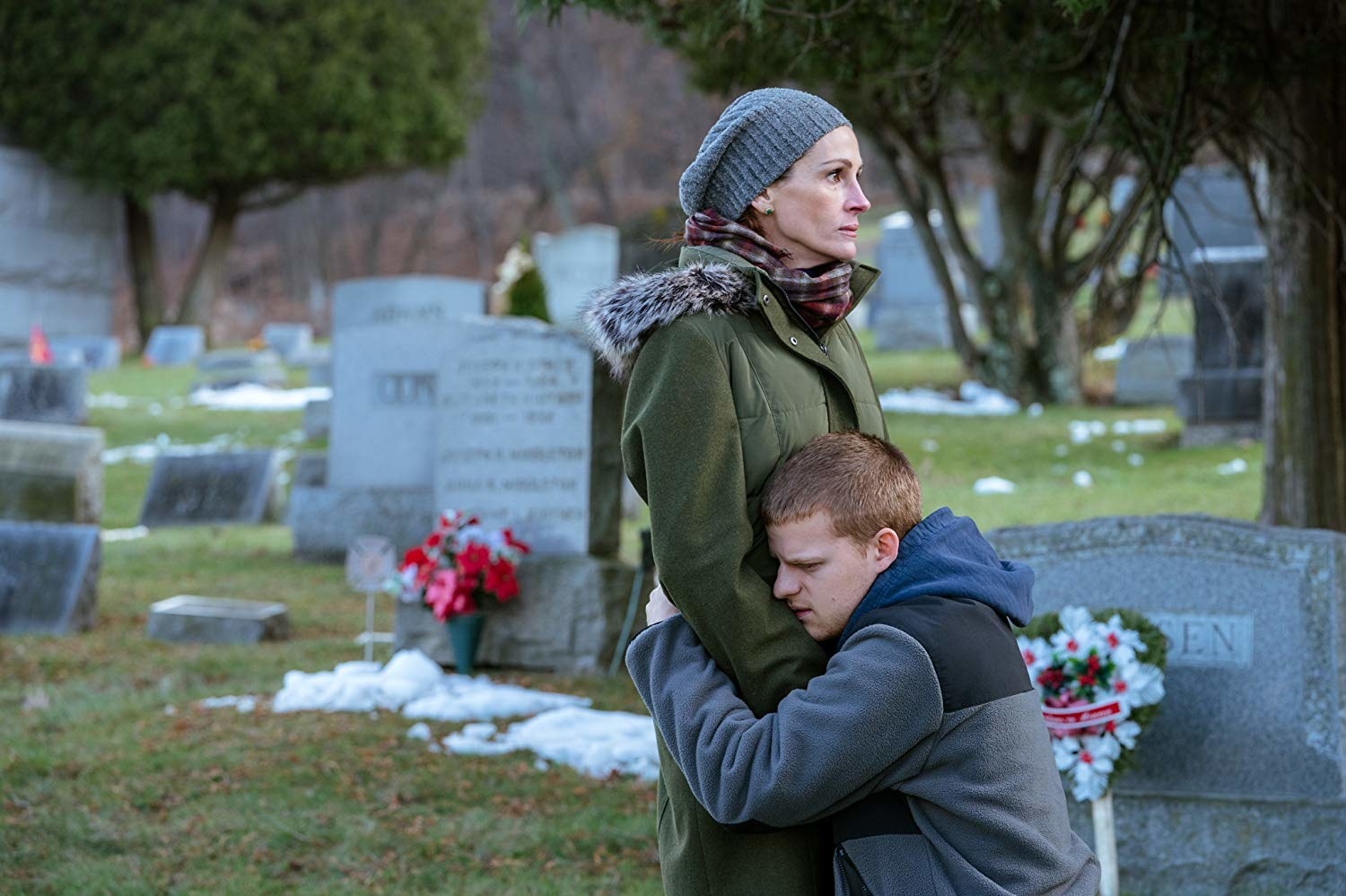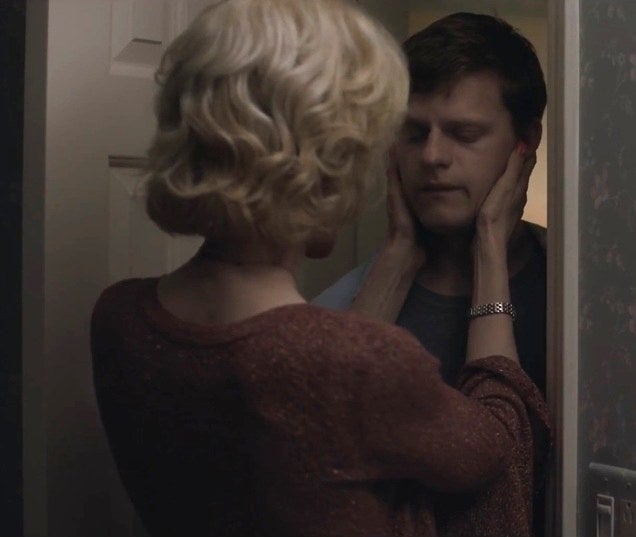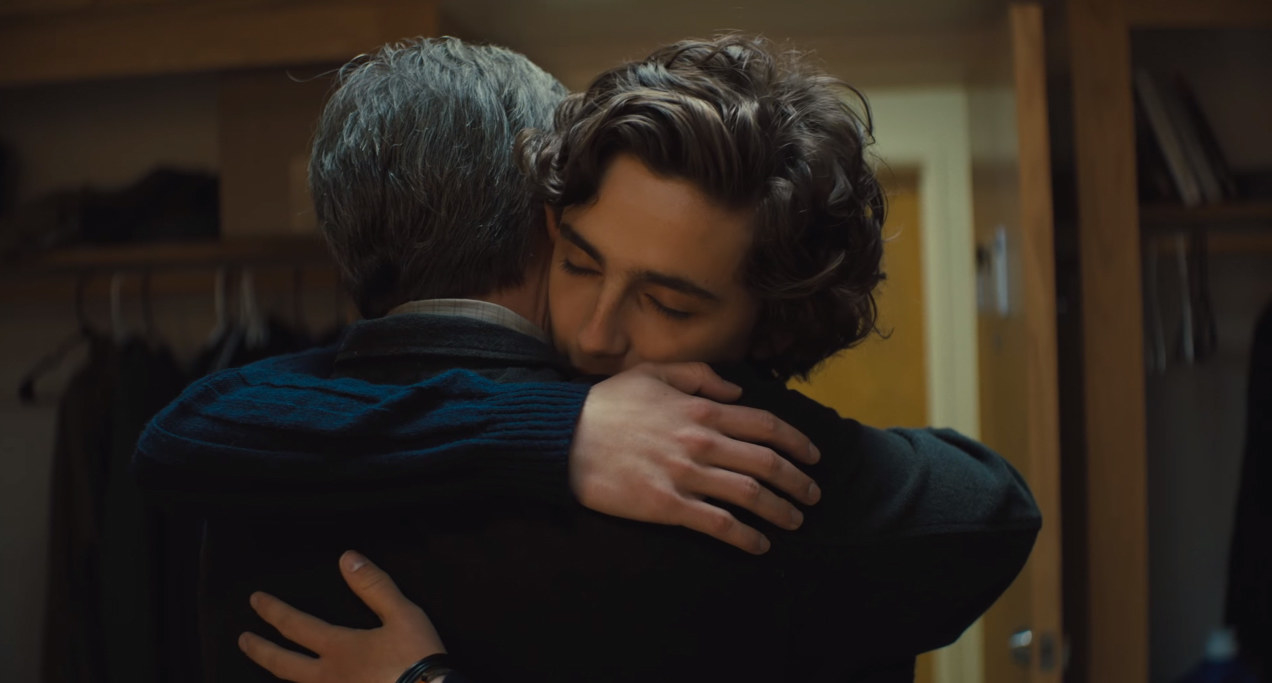
In Beautiful Boy, Timothée Chalamet plays a young man who's struggling with addiction, which his loving family reacts to first with disbelief and then with grief. It shouldn't be confused with Boy Erased, which stars Lucas Hedges as a young man who's struggling with his conservative Christian family's inability to accept his sexuality, leading to his being sent off to a conversion therapy program after he tells them that he's gay. You can see Hedges as an addict in another fall film, though, that may not have “Boy” in its title but that is very much about one — Ben Is Back, in which the actor plays a young man who leaves rehab to turn up unannounced on his family's doorstep just as they're getting ready for Christmas, a day of tense attempts at normalcy giving way to a night of drama. If awards bait has a face this year, it's that of a limpid-eyed white boy whose parents hover nearby in a state of imploring anguish.
These are films about characters trying to fight their way out from under a narrow vision of high-achieving white masculinity that's been laid on top of them like a weighted blanket.
When these movies roll into theaters in October, November, and December, respectively, it's possible they'll feel less like they complete a circuit, a trifecta about good intentions and sometimes poisonous approaches to “fixing” suburban sons. But at this year's Toronto International Film Festival, the traditional kickoff event of the fall movie season, they played over a succession of days, formulating a minor chord of parental panic. There are less obvious resonances between the stories, too, like the way Beautiful Boy is based on father-and-son memoirs by David and Nic Sheff, while Ben Is Back is the work of a father (writer-director Peter Hedges) and his son (Lucas Hedges). Or how Boy Erased and Beautiful Boy, the ones based on real accounts, each close with end cards contextualizing what happened with somber stats about the “ex-gay” movement and addiction as a disease. Ben Is Back and Beautiful Boy even both feature scenes in which their main characters rattle locked doors and windows while trying to get into their childhood homes, as if transformed into ghosts haunting the living.
These are, putatively, films about homophobia and about the opiate crisis, but they are just as much films about characters trying to fight their way out from under a narrow vision of high-achieving white masculinity that's been laid on top of them like a weighted blanket. Their loving onscreen parents share an inability to really see their sons for who they are, to look at them as more than examples of the shiny promise that every straight (or assumed-to-be) white boy from a stable, comfortable household is supposed to embody. Only one of these movies is called Beautiful Boy, but it's a title that could fit any of them, reflecting that adoring vision, that golden glow these young men are bathed in in their parents’ eyes. With it comes a sense of baffled betrayal — that these young men are somehow wasting the advantages that have been granted to them, not just by the people who raised them, but by society itself.

Because we still cherish and protect the potential of a young white man — and by “we” I mean people like the judge who justified his lenient sentencing of Brock Turner, rapist and Stanford swim team star, for sexual assault by arguing that “you have to take the whole picture in terms of what impact imprisonment has on a specific individual’s life,” or the friend who wrote a letter in his defense, insisting, “I don't think it's fair to base the fate of the next ten+ years of his life on the decision of a girl who doesn't remember anything but the amount she drank to press charges against him.”
That instinct is now leading Supreme Court nominee Brett Kavanaugh’s defenders to tie themselves in knots making “boys will be boys” arguments about the sexual assault allegations made against him by Christine Blasey Ford (which he denies). It's the reason the current opioid crisis, with its heavy effects on white rural and suburban communities like the one in Ben Is Back, attracts a different and more empathetic sort of attention than the heroin epidemic of the ’60s. It's there in the idea of the middle-class failson, ripe for radicalization thanks to his rage at having not made something of himself, the way he was told he would. It even colors movies like Ben Is Back and Beautiful Boy that are about this phenomenon, but that nevertheless introduce young women to serve as passing collateral in the lives of the young men whose stories continue long after the women have been discarded at the side of the road.
You get the sense that, if he were to only deny his true self forever, he would glide onward while a life clicked into place around him.
While the perceived promise of these boys can be a source of protection, it can also be the reason for harm done in the name of getting someone back on the right path. That's the case for Jared, the character Hedges plays in Boy Erased (adapted from the memoir by Garrard Conley), when he tells his parents he isn't straight. His stern father (Russell Crowe) and more circumspect mother (Nicole Kidman) respond to that revelation with an incomprehension that's not unlike what'd you'd expect if they'd just been told their child had gotten a face tattoo. Given the options of being cut off from his family or attending Love in Action, a program run by the “cured” director Victor Sykes (writer/director Joel Edgerton), Jared opts for the latter. Once there, he is subjected to a series of humiliations, cruelties, and outright abuse, inflicted in the name of help, until he turns back to his parents and insists that he is not the one who needs to change.
Any of the other attendees at the treatment center could probably make for a more dynamic protagonist — like Xavier Dolan as a true believer channeling his self-loathing into a faux-militaristic anger, or Troye Sivan as a reluctant presence who's figured out the right words to mouth in order to get home sooner. But it's Jared, bearing witness to all of this, who is the curiously passive main character, this high school basketball player, respectful boyfriend to a girl from church, and future inheritor of his dad's car dealership whose upright image has allowed him to exist without needing to make active choices. He is at once the center of attention and invisible. His reserve matches the movie's overall staidness, but also angles his experience as one of opting out of the frictionless life he was leading, rather than, like so many of the other characters, working desperately toward an idea of fitting into a community hostile to him. You get the sense that, if he were to only deny his true self forever, he would glide onward while a life clicked into place around him.

The title character Hedges plays in Ben Is Back, on the other hand, has already torched his shiny teen promise by the time he pays a surprise visit to his mother Holly (Julia Roberts), his stepdad Neal (Courtney B. Vance), and his siblings on Christmas Eve. In its marvelously acted first half, Ben Is Back feels like it could swerve at any moment into horror, largely because of the contrast between Holly's denial and the tense caution of some of the other family members, like Ben's sister Ivy (Kathryn Newton). Ben's addiction has caused serious domestic heartbreak, but Holly is only able to see this bright boy back in their lives, even as she gathers and hides all the jewelry and medication. It's not until the rambling, didactic second half, which finds Ben giving his mother a tour of the underbelly of their Westchester community, that she's made to confront the reality of her son. Ben's heroin addiction and subsequent rehab aren't in any way equivalent to the fraudulent, damaging practices Jared is subjected to in Boy Erased. But in both movies, the parents seem invested in the fantasy that a child could be dropped off somewhere for treatment, and, for a fee, refurbished and returned to factory settings.
The parents seem invested in the fantasy that a child could be dropped off somewhere for treatment, and, for a fee, refurbished and returned to factory settings.
When Neal points out, of Ben, that “If he were black, he’d be in jail by now,” it's an acknowledgment that the film verges on being a PSA about how middle-class white kids can destroy their lives with drugs too (while being unlikely to face the same consequences). But it's also a dig at how many chances Holly herself has given her son — out of love, but also because he still looks like any clean-cut college student home for the holidays (Hedges' disarming appeal goes a long way), and not like her idea of an addict with an obviously shaky hold on his sobriety. You feel Ben chafing under the burdens of this regard, whether it's from his mother or from the girl at a meeting who tells him how much it meant to hear a testimonial from someone like him. He's trying to get away from everything he's been allowed to get away with over the years.
David, the magazine writer dad played by Steve Carell in Beautiful Boy, lays out the shared theme of these movies most straightforwardly when he hollers impatiently at his son that “This is not who we are!” Who they are is the kind of people who live in a quietly swank house in Marin, who get published in the New York Times Magazine, who get into every college they apply to. When David first starts noticing that something is going on with his son (like Boy Erased, the movie skips back and forth through time), he treats it impatiently as a bump in the road to a surely radiant future for his son, not understanding that it's actually the start of a long, difficult journey for both of them. There's no room in David's comprehension for what's happening to Nic, for the ways in which he will go from overachiever to turning up near death in a hospital thousands of miles away. He waits, for far too long, for his son to just snap out of his habit.

Beautiful Boy is the best installment in this accidental trilogy, because director Felix Van Groeningen fully embraces what the other two only half realize, which is that these are stories about a warping romanticization. The camera takes in Chalamet, from his tumble of curls to the winglike bones of his back, with a lovesick gaze that has nothing to do with lust and everything to do with parental adoration, even as Nic's life gets darker — as he runs away, or turns up high and demanding money, or overdoses in a pool of honey-colored sunlight on the floor of a cafe restroom. David's regard for his son is like a physical weight Nic tries to free himself from. The film reflects the fact that he's only capable of seeing the immense promise in his son, even as that son grows up to be a man who only feels alive when there are drugs in his system.
If Beautiful Boy does net Chalamet his second Oscar nomination, it will be for how artfully he offers himself up as an object of consideration, the recipient of another's gaze — a reversal of a dynamic that's still normally reserved for women being regarded with desire on screen. That's true for all of these movies, really, and the primary desire on display in them is a parental one — to see the best in and do the best for one's child, a desire that can hamper as well as help. The insistence on seeing such boundless promise in these young white men is an act of supportive love, but it's also a reflection of the inequities of the world. Who else is expected to be able to do and be anything, never stumbling over obstacles in his path?
The three titles all reference their boys, but their actual point of view tilts toward the mothers and fathers, and the selective seeing they've been doing. And that becomes the takeaway of these movies, which are not the first, freshest, or most resonant ones to delve into drug addiction or the suffering caused by bigotry, but are sideways takes on the idea of the idealized son. The irresistible allure of the young white man with the world at his feet has a hold on all of these parents, from liberal Northern California creative types to devout Arkansas ministry members. They think they're providing every advantage, but the biggest favor they end up doing for their children is figuring out how to see them clearly. ●
